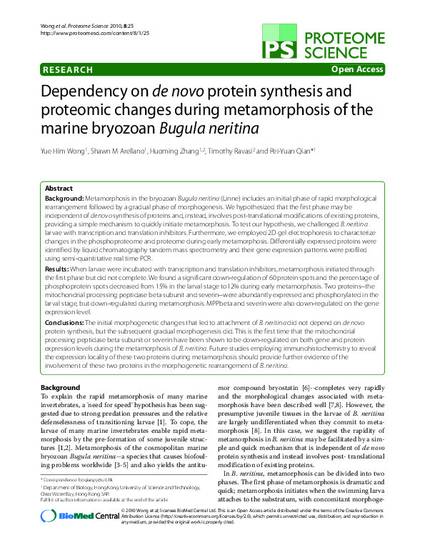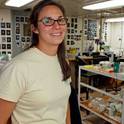
- Protein spot,
- Emetine,
- Protemic change,
- Swimming larva,
- Total proteome
Background: Metamorphosis in the bryozoan Bugula neritina (Linne) includes an initial phase of rapid morphological rearrangement followed by a gradual phase of morphogenesis. We hypothesized that the first phase may be independent of de novo synthesis of proteins and, instead, involves post-translational modifications of existing proteins, providing a simple mechanism to quickly initiate metamorphosis. To test our hypothesis, we challenged B. neritina larvae with transcription and translation inhibitors. Furthermore, we employed 2D gel electrophoresis to characterize changes in the phosphoproteome and proteome during early metamorphosis. Differentially expressed proteins were identified by liquid chromatography tandem mass spectrometry and their gene expression patterns were profiled using semi-quantitative real time PCR.
Results: When larvae were incubated with transcription and translation inhibitors, metamorphosis initiated through the first phase but did not complete. We found a significant down-regulation of 60 protein spots and the percentage of phosphoprotein spots decreased from 15% in the larval stage to12% during early metamorphosis. Two proteins--the mitochondrial processing peptidase beta subunit and severin--were abundantly expressed and phosphorylated in the larval stage, but down-regulated during metamorphosis. MPPbeta and severin were also down-regulated on the gene expression level.
Conclusions: The initial morphogenetic changes that led to attachment of B. neritina did not depend on de novo protein synthesis, but the subsequent gradual morphogenesis did. This is the first time that the mitochondrial processing peptidase beta subunit or severin have been shown to be down-regulated on both gene and protein expression levels during the metamorphosis of B. neritina. Future studies employing immunohistochemistry to reveal the expression locality of these two proteins during metamorphosis should provide further evidence of the involvement of these two proteins in the morphogenetic rearrangement of B. neritina.
Proteome Science20108:25
https://doi.org/10.1186/1477-5956-8-25
© Wong et al; licensee BioMed Central Ltd. 2010
Available at: http://works.bepress.com/shawn-arellano/18/

Proteome Science20108:25
https://doi.org/10.1186/1477-5956-8-25
© Wong et al; licensee BioMed Central Ltd. 2010